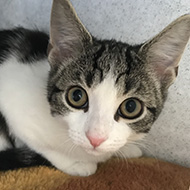
The charity had never come across the condition before.
A kitten, taken in by Cats Protection, has surprised its carers and vets after it was found that they could not be deemed male or female.
Brought into Cats Protection Warrington, and later transferred to the charity's Tyneside Adoption Centre, the cat – named Hope by the Cats Protection team – did not have any external sex organs.
After further inspection, it was found that they had no sex organs, externally or internally.
Fiona Brockbank, Cats Protection's senior field veterinary officer, explained: “We carried out a procedure to look for sex organs but there’s nothing apparent inside or out. There’s an outside possibility of some ectopic ovarian tissue hiding away internally but we think this is extremely unlikely.
“This is so rare that there isn’t really a commonly used term for this condition, but it is effectively ‘sexual organ agenesis’ – where agenesis is the lack or failure of development in relation to body organs.”
Cats with both male and female sex organs, known as hermaphrodite cats, are also incredibly rare. Hope, however, is an even rarer case.
“This is not something we’ve come across before at Cats Protection,” Fiona continued.
“While this means we don’t have any previous cases to base our knowledge of how this will affect Hope in the future, we spent time monitoring this cat to ensure they can urinate and defecate appropriately before they were considered ready for rehoming.”
Staff and volunteers at the charity have commented on 15-week-old Hope's playful nature, and Beni Benstead, Tyneside centre manager, said: “Discovering Hope’s special status has been an exciting time as none of us have seen this before or are likely to again.”
After confirming that Hope is a happy and healthy kitten, they were able to be adopted. Renamed Beans, the kitten has now found their forever home.
Image (C) Cats Protection



 BSAVA is to partner with BVA Live (11-12 June 2026) to champion clinical research.
BSAVA is to partner with BVA Live (11-12 June 2026) to champion clinical research.